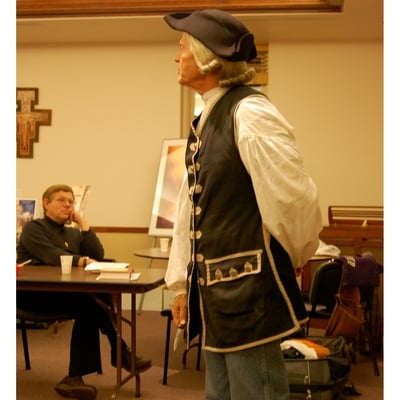(BW3 contemplating Mr. Wesley in blue jeans)
We are all busy people. And unless we are unemployed a normal Christian life looks like this: 1) eight or more hours a day Monday through Friday we are working; 2) 7-8 hours a day we are resting or sleeping; 3) 1 hour a day, or more, we are eating and excreting; 4) if we commute to work add another 1 hour a day at the least; 5) add an a hour a day for showering, grooming, exercising; 6) if we have children at home, subtract at least another 1-2 a day for at least one of the parents. On average, not counting weekends, this leaves a person with about 1 hour a day of ‘free time’ or perhaps a bit more. What could spiritual formation look like in such a life besides prayer at meals and bedtime, and perhaps a little bedtime reading of the Bible, or perhaps first thing in the morning. Spiritual formation for my parents came in the form of reading their Upper Room at night before turning out the lights, and maybe Halley’s Bible Handbook and a Bible passage.
Mr. Wesley had some serious thoughts about spiritual formation for the ordinary Christian, and he discourses on the matter in his sermon entitled ‘The Means of Grace’ Note that baptism is not listed because most everyone in England had been baptized as an infant in some parish, so it could not be an ongoing means of grace for a person. Here is a little excerpt about what he thought was such a means of grace for us all.
:
“By
“means of grace” I understand outward signs, words, or actions,
ordained of God, and appointed for this end, to be the ordinary channels
whereby he might convey to men, preventing, justifying, or sanctifying grace.” He does not deny there are other, extraordinary
channels of grace, but here he is referring to the ordinary ones, the very ones
that normal Christians have a chance to encounter normally, even on a day by
day basis. He goes on to say.
“The chief of
these means are prayer, whether in secret or with the great congregation;
searching the Scriptures (which implies reading, hearing, and meditating
thereon); and receiving the Lord’s Supper, eating bread and drinking wine in
remembrance of Him: And these we believe to be ordained of God, as the ordinary
channels of conveying his grace to the souls of men.”
In other words, Wesley saw spiritual formation primarily happening in a congregational context, or a small group context, but not primarily in a solitary context, much less in a scenario where one ‘get’s thyself to a nunnery’. Thus a lot of it had to be done on Sundays. In the next post I want to talk about the communal context for spiritual formation as being primary and private spiritual formation efforts being secondary.


